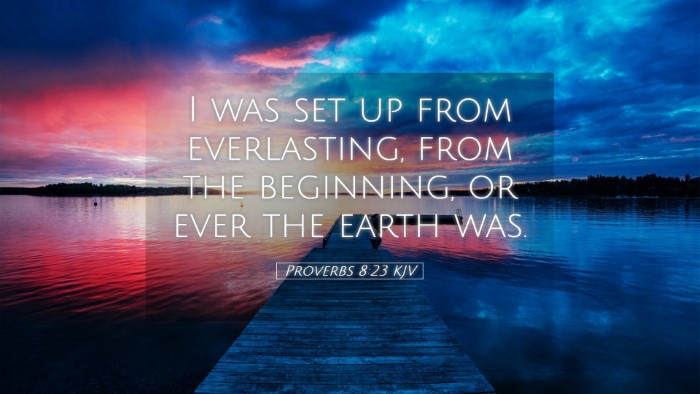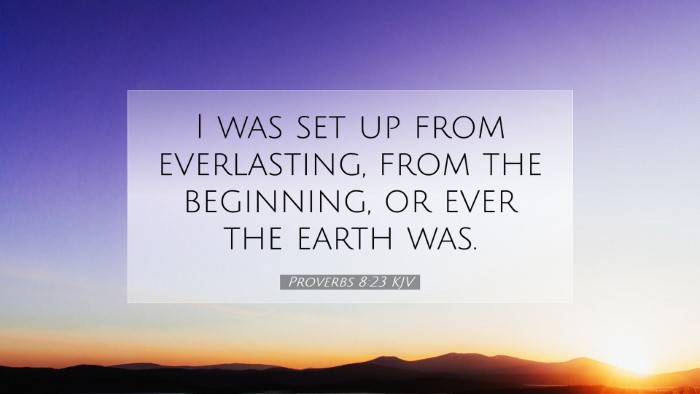Proverbs 8:23 - Commentary and Insights
Proverbs 8:23 states: "I was set up from everlasting, from the beginning, or ever the earth was." This verse reflects the profound truth about wisdom, personified in this chapter. Wisdom is depicted not just as a trait or virtue but as an eternal being, present before creation itself. Such a declaration carries immense theological weight, particularly in understanding the nature of wisdom in relation to God and creation.
Contextual Analysis
The book of Proverbs is a collection of wise sayings primarily attributed to King Solomon. Here, in Chapter 8, wisdom is articulated not only as an attribute of God but also as a guiding force for human life. This chapter portrays wisdom as a figure calling out to humanity, offering life and prosperity.
The Nature of Wisdom
Matthew Henry notes that wisdom's ancient origins signify its divine nature. Wisdom was not an afterthought in God’s creation but rather an integral part of the creative process. It suggests that God’s plans and purposes are rooted in wisdom from the very beginning.
Theological Implications
Albert Barnes emphasizes the distinction of wisdom as having a pre-existence akin to that of Christ portrayed in the New Testament. This alludes to the concept that while the creation and manifestation of the universe brought forth time and space, wisdom itself transcends these dimensions, being eternally present with God.
Creation and Order
Adam Clarke elaborates on the idea that wisdom was present during the creation of the world, noting its role in establishing order and purpose. This understanding posits that the universe itself operates under wise principles, aligning with the cosmic order instilled by God. Such insights are invaluable for understanding the relationship between divine wisdom and creation.
Application for Pastors and Theologians
Understanding Proverbs 8:23 enriches the theological discourse on wisdom and its application in pastoral care and teaching. The eternal existence of wisdom forms the backbone for moral instruction, emphasizing that life choices should align with divine counsel.
Wisdom as Guidance
- Practical Decisions: Pastors can encourage their congregants to seek wisdom in daily decisions, framing it as a God-given tool rather than mere human logic.
- Teaching Legacy: The implication that wisdom was present since eternity suggests a weighty responsibility on pastors to deliver time-tested truths to their flocks, ensuring that teachings reflect this eternal wisdom.
- Leadership in Confusion: During periods of societal unrest or confusion, the church has the opportunity to model decision-making rooted in wisdom, demonstrating the stability that comes from divine guidance.
Lessons for Students and Scholars
For students and scholars of Scripture, the implications of Proverbs 8:23 invite deeper exploration into the nature of divine wisdom throughout biblical text.
- Intertextuality: Study how wisdom in Proverbs correlates with wisdom literature throughout the Bible, including Ecclesiastes and the New Testament's teachings about Jesus as the incarnate wisdom.
- Philosophical Inquiry: Engage with the philosophical ramifications of wisdom's personification, particularly in understanding pre-Christian thought and its resonance with Jewish and early Christian teachings.
- Cultural Relevance: Analyze how contemporary culture perceives wisdom, contrasting secular views versus the biblical narrative of wisdom as being rooted in a relationship with God.
Conclusion
In reflecting on Proverbs 8:23, we are invited to consider the eternal qualities of wisdom. The insights from Matthew Henry, Albert Barnes, and Adam Clarke collectively affirm the timeless and transcendent nature of wisdom that arises from God. As students, scholars, and pastors delve into this verse, they can draw not only theological understanding but also practical applications that resonate throughout their ministries and academic pursuits.
Ultimately, embracing wisdom as an eternal truth offers a foundation for all aspects of life, guiding ministry practices, scholarly pursuits, and personal conduct in a manner that honors divine intent and order within creation.


